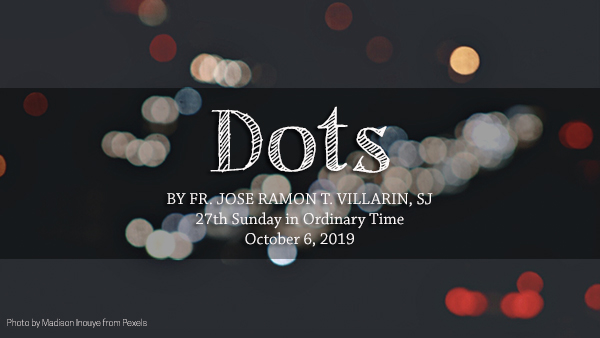


Fr. Jose Ramon T. Villarin, SJ
27th Sunday in Ordinary Time
October 6, 2019
It helps to know that earth is, well, small. Not the stars, those little twinkling dots in the night sky, but the earth. The earth is the dot in the midst of countless beach balls floating on an immense ocean we call the universe.
We humans are, well, humus. We are of the earth as Adam is shaped from the earth (which in Hebrew is “adamah”). We humans are supposed to be familiar with smallness and being bound to the ground. In truth, we are dust. If we are rooted in soil and in layers that are soiling and soiled, we might know better than the rest of creation (including those giant stellar balls of fire) what it means to be humble and humbled.
But we do not seem to get this. The lesson of our true size and place is hard to learn. We deny our dustiness despite the tombstones we plant on earth. The endgame escapes us. We forget who we are even if death reminds us of who we are not.
We play God; we think ourselves superior to others; righter than right, we imagine ourselves to be infinite and immortal. And we forget that our desire to live after death, even our longing for good to triumph over evil, for light to scatter the dark, all our hope ultimately hinges on the realness of God.
“How long O Lord?” the prophet asks today. How long are we to wait for injustice to end, for ruin and misery to leave us? “Destruction and violence are before me; there is strife, and clamorous discord.”
Somewhere in between our question marks, a glimmer of an answer is given by God even though God (if God is God) does not really have to answer. Wait for it, he tells us, wait for the vision which has its own time, for God’s own dream which “presses on to fulfillment, and will not disappoint; if it delays, wait for it, it will surely come, it will not be late.”
The skeptic and cynic will dismiss this hope as wishful thinking; the pragmatic will excuse this promise as just another fairy tale projection of a child’s fertile and fanciful mind.
The person of faith however knows otherwise. Before the timeframe of eternity, the faithful one learns patient endurance. The one who reposes his or her life in God keeps time differently. Before all that is unclear and unreachable, the faithful one soon discovers that much of faith is waiting in the dark, keeping vigil, staying awake and listening for God.
The Gospel today expands this image of ourselves waiting in faith for God. Should master be grateful to servant if servant did serve and only did what servants are supposed to do? In the end, we are told, “When you have done all you have been commanded, say, ‘We are unprofitable servants; we have done what we were obliged to do.'”
If master is master, there can be no debt owed by master to servant. And for servants who are servants, there is only indebtedness and duty to be paid. The ones who would play master are those who fancy themselves deserving of more than what they have received. Feeling entitled, these servants conveniently forget the size of their debt.
Those luminous dots in the evening sky remind us of our smallness and the true size of our debt.
The face of Christ reminds us of one evening when the Master of masters was on his knees washing our feet his servants, redeeming the debt of our sins away.
There in the dark, we wait in humility and we mark time according to the beating of the heart of God. We look at the night sky that is awash with unreachable dots of light and we realize ultimately that faith is all about waiting, waiting for God as we wait on those we serve and love.